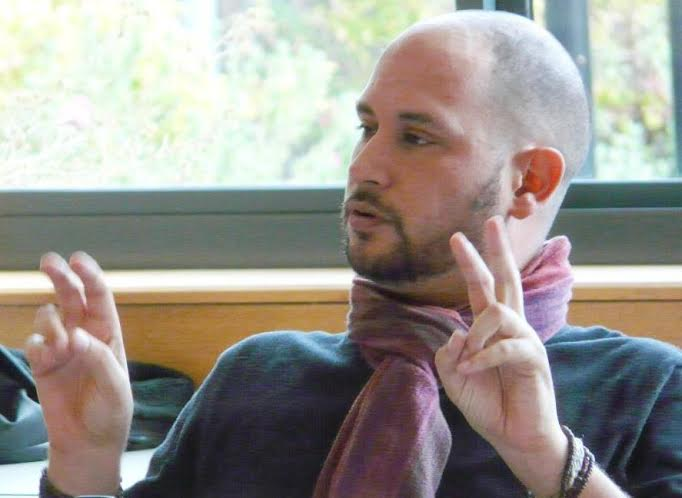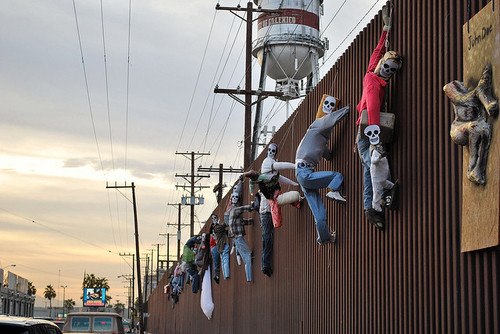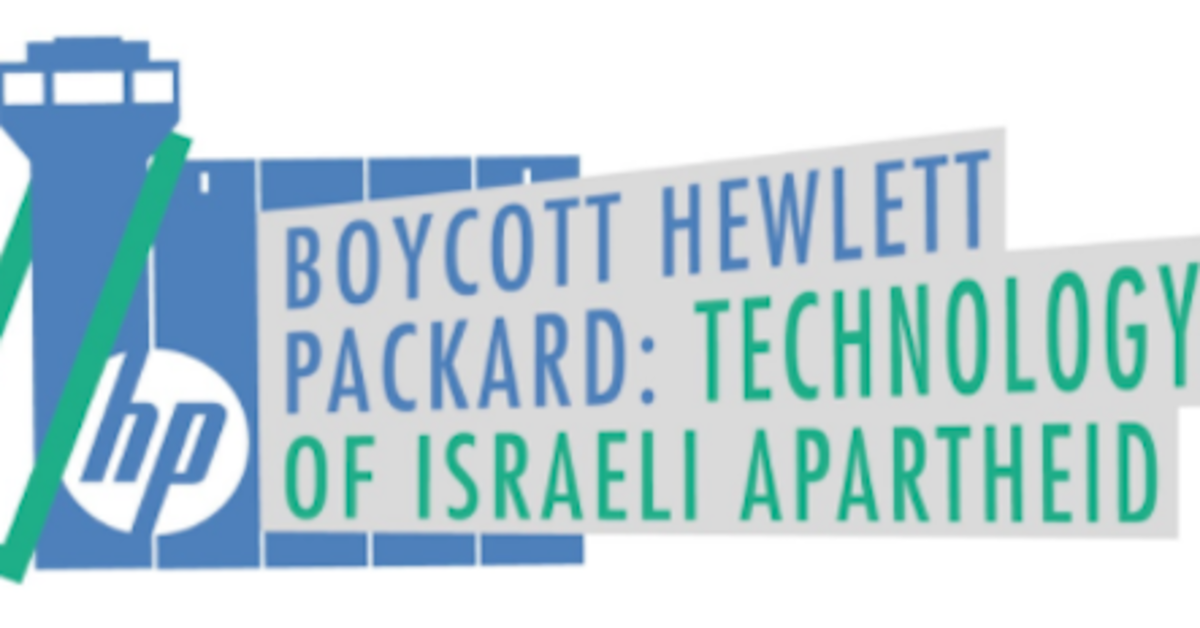From checkpoints to the Israeli military, HP provides technology to oppress Palestinians #StopHP #HPEDiscover http://thndr.me/j1bp4x

Anarchy On Air
A radio show on 88.1 FM WESU Middletown, CT - 2nd/4th Tuesdays 4:00-4:55 pm ESTAnarchist perspectives on politics and culture with a focus on resistance and activism. Episodes feature news, interviews, and music.

The December 8th episode and final episode of the season features an interview J. Kehaulani Kauanui recently conducted with Andrej Grubačić, an anarchist dissident and historian who has written prolifically on anarchism and the history of the Balkans. He is an associate professor at the California Institute of Integral Studies and Z Media Institute in San Francisco. Andrej is founding member of the Global Balkans network of the Balkan anti-capitalist diaspora, the Yugoslav Initiative for Economic Democracy, Kontrapunkt magazine, and ZBalkans. He is or has been active as an anarchist organizer in networks such as Planetary Alternatives Network, the post-Yugoslav coalition of anti-authoritarian collectives DSM!, Peoples Global Action, the World Social Forum, Freedom Fight and, most recently, as a program director for the Global Commons. He is the author of Don’t Mourn, Balkanize (Znet 2010). Additionally, Andrej has edited a book titled, From Here To There, of which is a collection unpublished talks and hard-to-find essays from legendary activist historian Staughton Lynd (PM Press), as well as a book titled, Wobblies & Zapatistas: Conversations on Anarchism, Marxism, and Radical History, by Staughton Lynd & Andrej Grubacic
( PM Press).
On this episode of Anarchy on Air, we feature scholar, organizer, and professor Ruth Wilson Gilmore from a talk she delivered at a panel discussion for the annual symposium of Feminist, Gender, and Sexuality Studies at Wesleyan University on November 6th.

Ruth Wilson Gilmore serves as a professor of geography in the doctoral program in earth and environmental sciences and as associate director of the Center for Place, Culture and Politics at the Graduate Center at City University New York. Her wide-ranging research interests include revolution and reform, environments and movements, prisons, urban-rural continuities, and the African diaspora. In her first book, Golden Gulag: Prisons, Surplus, Crisis, and Opposition in Globalizing California (2007), she examined how political and economic forced produced California’s prison boom. In 2012, the American Studies Association honored Gilmore with its Angela Davis Award for Public Scholarship, an award that recognizes scholars who have applied or used their scholarship for ‘public good.’ Gilmore lectures widely and works regularly with community groups and grassroots organizations and is known for the broad accessibility of her research.

In episode three of our fourth season, we feature an action news roundup produced by group members Daniella and Dinayuri followed by an interview with scholar and activist Matthew Dineen.
Based in Philadelphia as a published writer and political organizer for the past 15 years, Matt has served on the board of directors of a community radio station in Western Massachusetts and coordinated events programming at a local radical bookstore. In addition to various community centers and bookstores, he has presented at the Smithsonian Center for Folklife and Cultural Heritage in Washington, DC; the Goddard Graduate Institute in Plainfield, VT; and Interference Archive in Brooklyn, NY.
His latest project, called Music & Work, seeks to explore the role that music plays in our working lives. This project examines the realities of wage labor through the lens of music, with the hope that it has the potential to heighten our understanding of capitalist society – and hopefully illuminate possibilities beyond our current economic system. And unlike existing academic and corporate research on music in the workplace, this exploration is from the bottom up; from the eyes and ears of actual workers. Find more information on the project at http://themusicandworkproject.blogspot.com/.

In episode two of our fourth season, we feature an action news roundup produced by group members Daniella and Dinayuri followed by an interview with investigative journalist Habib Battah conducted by Harry. The interview focuses on the recent civil unrest in Lebanon and the protest movement there known as #YouStink.
Battah is an investigative journalist, filmmaker and editor of the news site beirutreport.com. He has covered Lebanon and the Middle East for over 15 years, as a contributor to The Guardian, BBC News, Al Jazeera English, Vice on HBO, CNN, Variety, Aramco World, The Daily Star Lebanon and other local publications and broadcasters. He is a TedX speaker, journalist fellow at the American University of Beirut, and two-time recipient of the Samir Kassir Press Freedom Award.
His recent investigations in Lebanon have covered demolitions of archeological and architectural heritage sites, the unregulated privatization of public space, green space, and coastal waterways as well as the role of activists and media framing in pressuring change and influencing decision making in these areas. He has also reported extensively on the lack of transparency and accountability in civil works projects and problematic public utilities, such as Lebanon’s internet (which is among the slowest in the world).
Lately, Battah has been focusing on Lebanon’s #YouStink grassroots movement in the context of the recent municipal waste crisis, looking at how calls for accountability there have given rise to a number of anti-corruption spin off movements and a series of civil disobedience actions across the country.

Season 4 Episode 1
The first episode of AOA’s fourth season, hosted by group members Tess and Harry, focuses on the crisis in Syria and the struggle of millions of refugees and displaced people who have been forced to leave their homes. We open with some music by the Syrian Producer, Kaan Wafi. The track is called “Tyrant’s Shore,” off of the album Pieces in Exile. Next, we hear from AOA working group member Danielle, who interviewed Omar S. Dahi about the situation on the ground in Syria. In the latter part of the episode, two members of our working group, David and Daniella, interview Harsha Walia of No One Is Illegal, an anti-colonial grassroots community organization committed to fighting for migrant justice. Mass displacement resulting from civil war in Syria has been met with hostile immigration and refugee policies in Canada. A transnational critique of capitalism, neoliberalism, and racialized violence, the work of No One Is Illegal is deeply interrelated with the struggle for indigenous sovereignty.
Guest info:
Omar Dahi is an associate professor of economics at Hampshire College. His research and teaching interests are in the areas of economic development and international trade, with a special focus on the political economy of the Middle East and North Africa and on South-South economic cooperation. He serves on the editorial committee at the Middle East Report and as a co-editor of the Syria page for Jadaliyya e-zine. He is also a member of the Econ4 Network.
Harsha Walia is a social justice activist and journalist who is well known for co-founding the Vancouver chapter of No One Is Illegal. She is widely published in numerous journals, anthologies, and magazines. Walia is the author of the book Undoing Border Imperialism, which reformulates immigrant rights movements within a transnational analysis of capitalism, labor exploitation, settler colonialism, state building, and racialized empire. Hence it provides the alternative conceptual frameworks of border imperialism and decolonization. Walia has been named one of the most influential South Asians in British Columbia by The Vancouver Sun, and one of the ten most popular left-wing journalists by The Georgia Straight in 2010. She is the winner of the Canadian Center for Policy Alternatives “Power of Youth” award.

Our last episode of season 3 features the opening panel discussion from the Anarchism, Decolonization, and Radical Democracy Symposium held at Haverford College. The symposium explored the common ground and tensions that exist between these critical perspectives by providing a unique forum for conversation amongst an international ensemble of respected organizers and scholars. Ruth Kinna and Chris Dixon discuss Anarchism, Todd May and Dilar Dirik speak about Radical Democracy, and J. Kēhaulani Kauanui and Harsha Walia speak to Decolonization.
We close with the song “Genua” by Swedish Anarcha-punk group Sju Svåra År.

Episode 6 of Season 3 features an excerpt from 2 talks, one of which was given by Steven Salaita at Wesleyan in April entitled: Silencing Dissent: Academic Freedom and Palestine about his current lawsuit against the school that fired him, University of Illinois Urbana-Champaign. The other talk is taken from the Jewish Voice for Peace 2015 National Membership Meeting in March, at a workshop entitled From the Southwest Border to Palestine: Oppression, Militarization and Resistance. It features reporter Todd Miller speaking about the growing role of Israeli companies in the militarization of the US-Mexico Border. We end the episode with the song Long Live Palestine part 2 by Lowkey.

This episode features a talk given by Dilar Dirik on March 27th, 2015 at the Haverford College Mellon Symposium titled “Anarchism, Decolonization and Radical Democracy”.
Dirik is an activist of the Kurdish Women’s Movement and a PhD candidate in the Sociology Department of the University of Cambridge. Her work compares the intersections of gender and institutions of power such as nationalism, capitalism, and the state in the Kurdish liberation movement.
Dirik’s talk, titled “Liberating Democracy from the Premises of the Dominant Global Order: The Rojava Revolution” is prefaced with a more thorough introduction by Dan Skiano.

Episode 4 of Season 3 opens with Rumble by sARAcONNa, a member of the Poor People’s Economic Human Rights Campaign (PPEHRC). PPERHC is a movement that unites the poor across color lines in a mission to “abolish poverty everywhere and forever.” In this episode, AOA interviews Cheri Honkala, the National Coordinator of PPEHRC.
This episode also features an interview with Eduardo, a student/activist in the Confederacion Nacional de Trabajo (The National Confederation of Labor) in Spain. This confederation of anarcho-syndicalist labor unions is committed to the basic principles of workers’ self management, federalism, and mutual aid.
We close with “No Pasarán,” a Spanish anarchist song from the 1930s, followed by “A Las Barricadas,” by Ramon Muns.
